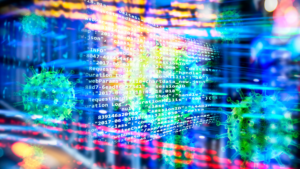Introduction: In the annals of history, the Renaissance period stands out as a time of profound transformation and enlightenment, a period when humanity made giant strides in art, science, and understanding of the world. Today, in the realm of cybersecurity, we are witnessing a similar transformative era – thanks to the advent of Artificial Intelligence (AI) and Machine Learning (ML). Just as the Renaissance reshaped society, AI and ML are reshaping how we approach cybersecurity, turning what was once a reactive field into a proactive, predictive discipline.
The Role of AI and ML in Modern Cybersecurity: The integration of AI and ML into cybersecurity is revolutionizing the way we defend against and respond to threats. Gartner1 predicts that by 2025, lack of talent or human failure will be responsible for over half of significant cyber incidents. Traditional security measures, often static and rule-based, are increasingly inadequate against sophisticated cyber-attacks. AI and ML introduce dynamic, intelligent systems capable of learning from and adapting to ever-evolving threats.
- Predictive Threat Detection:
- AI algorithms can analyze vast amounts of data to identify patterns and anomalies indicative of potential threats.
- ML models, trained on historical data, can predict attack vectors and potential security breaches before they occur, allowing for pre-emptive measures.
- Real-Time Threat Response:
- AI-driven systems provide real-time analysis, enabling quicker response times to threat.
- Automated incident response protocols powered by AI can mitigate threats efficiently, reducing the need for human intervention in routine cases.
- Enhanced Accuracy and Efficiency:
- AI reduces the likelihood of false positives, a common challenge in traditional security systems.
- ML algorithms continuously improve over time, enhancing their accuracy and effectiveness in threat detection and response.
Case Studies and Real-World Applications:
- Financial Sector Implementation: Banks and financial institutions use AI to monitor for fraudulent activities, with systems that can detect unusual transaction patterns in real-time. As pointed out by Infosys BPM2, “AI makes fraud detection faster, more reliable, and more efficient where traditional fraud-detection models fail.”
- Healthcare Data Protection: AI algorithms help secure sensitive patient data, quickly identifying and countering data breaches or unauthorized access. Science Direct3 has conducted a study that summarizes the state-of-the-art approaches for preserving privacy in AI-based healthcare applications.
Integrating AI into Existing Security Systems:
- The integration process involves both technical and organizational challenges, including compatibility with existing IT infrastructure and training personnel.
- There’s an emphasis on creating a synergy between human experts and AI systems, where AI handles large-scale data analysis, and humans focus on strategic decision-making. Our recent blog article4 explores this synergy in more detail.
Challenges and Considerations:
- Data Privacy and Ethics: The implementation of AI in cybersecurity presents crucial concerns regarding data privacy and the ethical handling of personal information. According to a report5 by The Brookings Institution’s Artificial Intelligence and Emerging Technology (AIET), big data is characterized by its volume, variety, and velocity. The sheer amount of data enhances analytical depth, the diversity of data types enriches insights, and the rapidity of data generation facilitates real-time analysis and predictions. The increasing influx of data from mobile phones and other digital devices magnifies these elements, drawing significant attention to privacy as a major issue in global public policy discussions.
- AI Security: Ironically, AI systems themselves can become targets for hackers. Ensuring the security of AI algorithms is a critical concern. The same AI technology that bolsters cybersecurity can also be exploited by cybercriminals, as highlighted in this CNBC article6. Hackers can utilize AI to uncover patterns in computer systems, pinpointing vulnerabilities in software or security defenses. This capability allows them to target and exploit these newly identified weaknesses, presenting a substantial challenge to cybersecurity efforts.
The Future of AI-Driven Cybersecurity Solutions:
- Looking ahead, we can anticipate more autonomous security systems capable of not just defending against, but also proactively countering, cyber threats.
- Developments in AI and ML will likely focus on enhancing decision-making processes, reducing response times, and improving accuracy.
Conclusion: As we embrace this ‘Cybersecurity Renaissance’, powered by AI and ML, we stand at the threshold of a new era in digital security. Like the Renaissance that remade Europe, AI and ML are fundamentally remaking cybersecurity – turning it into a field not just of defense, but of intelligence, prediction, and proactive action. The future of cybersecurity is not just about countering threats; it’s about foreseeing them, understanding them, and being always a step ahead. This is our new reality – a safer, smarter, AI-driven world.
Discover the unstoppable power of DEFEND and PlurilockAI, the ultimate AI-generated tools that crush security threats.
Get in touch with sales@aurorait.com or call (888) 282-0696 to experience the unmatched protection that Aurora, a proud member of the Plurilock family, delivers through these groundbreaking solutions.
References:
- https://www.gartner.com/en/newsroom/press-releases/2023-02-22-gartner-predicts-nearly-half-of-cybersecurity-leaders-will-change-jobs-by-2025
- https://www.infosysbpm.com/blogs/bpm-analytics/fraud-detection-with-ai-in-banking-sector.html#:~:text=AI%20can%20detect%20and%20flag,block%20maleficence%20and%20prevent%20fraud.
- https://www.sciencedirect.com/science/article/pii/S001048252300313X
- https://aurorait.com/2023/08/31/managing-the-risks-of-generative-ai-and-llms-through-technological-advances/
- https://www.brookings.edu/articles/protecting-privacy-in-an-ai-driven-world/
- https://www.cnbc.com/2022/09/13/ai-has-bigger-role-in-cybersecurity-but-hackers-may-benefit-the-most.html




